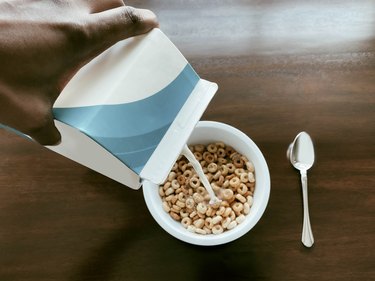
Abdominal upset, such as gas, cramps, bloating, constipation or diarrhea, could mean you're not tolerating that glass of milk you had at breakfast or that slice of cheese you had in your lunch.
Being lactose intolerant means you can't digest the lactose or natural sugars found in most dairy products. According to the American Academy of Family Physicians, millions of Americans suffer from lactose intolerance. Lactaid allows you to get the recommended daily dairy allowance, without the GI symptoms.
Video of the Day
Video of the Day
Serving Size and Varieties
One serving of Lactaid milk is 1 cup or 240 mL with eight servings per container. Varieties include:
- Reduced-fat 2 percent
- Low-fat 1 percent
- Fat-free
- Whole
- Chocolate low-fat 1 percent
Lactaid Calcium-Enriched Milk includes reduced-fat 2 percent, low-fat 1 percent, fat-free and whole milk. Lactaid milk also comes in organic in reduced-fat 2 percent and fat-free.
Ingredients
Lactaid whole milk contains milk, lactase enzyme — an ingredient not found in regular milk and vitamin D3. Lactaid reduced-fat 2 percent and fat-free Lactaid contain reduced or fat-free milk, lactase enzyme, vitamin A palmitate and vitamin D3.
Lactaid calcium-enriched whole milk contains milk, tribasic calcium phosphate-calcium, carrageenan, guar gum, lactase enzyme and vitamin D3. This milk also contains 500 milligrams calcium per serving, while regular milk contains 300 milligrams calcium per serving.
Calories, Fat, Cholesterol and Sodium
One cup of Lactaid whole milk has 160 calories, 8 grams fat — 5 grams saturated fat, 35 milligrams cholesterol, 125 milligrams sodium and 350 milligrams potassium.
Reduced fat 2 percent has 130 calories, 5 grams fat — 3 grams saturated fat, 20 mg cholesterol, 125 milligrams sodium and 370 milligrams potassium.
Fat-free Lactaid has 90 calories, no fat, less than 5 milligrams cholesterol, 125 milligrams sodium and 380 milligrams potassium. Lactaid is real milk, 100 percent lactose free and it tastes just like real milk.
Carbohydrates and Protein
A single serving of Lactaid whole milk has 12 grams total carbohydrates, no dietary fiber, 12 grams sugars and 8 grams protein. Reduced Fat 2 percent and Fat Free Lactaid have 13 grams total carbohydrates, no dietary fiber, 12 grams sugars and 8 grams protein. Lactaid can be used on cereal as well as a milk substitute in recipes calling for milk.
Vitamins and Minerals
Lactaid whole milk, reduced-fat and fat-free provide 6 to 10 percent of the daily value of vitamin A, 25 percent vitamin D and 30 percent calcium. Lactaid calcium-enriched whole milk provides 6 percent of the daily value of vitamin A, 15 percent vitamin B12, 25 percent riboflavin and vitamin D, 35 percent phosphorus and 50 percent calcium.